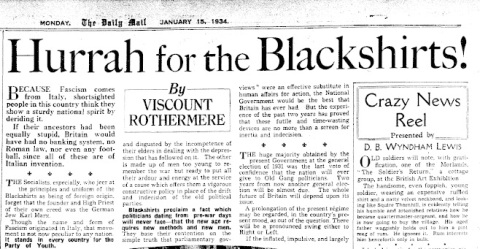Je suis saboteur
Today’s Daily Mail front page is in full censorious mode following the announcement yesterday morning of a snap election by the UK’s not at all unelected Prime Minister.

As can be seen, those who voted remain in last year’s EU referendum have now been reclassified by the Mail. We’re no longer Remoaners, but Saboteurs.
Indeed the Mail headline has been greatly exercising the Twittersphere this morning, with its wording being compared with both extreme wings of politics (the phrase “Crush the Saboteurs” was first used by Lenin in January 1919. Ed.), with several reminders of the Mail’s infamous Hurrah for the Blackshirts headline from January 1934.

Since this morning Mrs May has defended the Mail’s intemperate stance and headline, pleading “freedom of the press”. Some would argue freedom comes with a sense of responsibility attached, Mrs May.
As someone who voted remain in the referendum and still regards the course towards a so-called hard Brexit favoured by the Prime Minister and entailing leaving the Single Market, the course of action she is advocating looks to me like the ultimate sabotage.
As a person whose life is built around words, the definition and etymology of the word sabotage interests me.
According to Dictionary.com, sabotage has the following meanings as a noun:
- any underhand interference with production, work, etc., in a plant, factory, etc., as by enemy agents during wartime or by employees during a trade dispute; and
- any undermining of a cause
.
Sabotage can also be used as a verb, meaning to injure or attack by sabotage.
As regards the origins of sabotage, it came into use in English in the late 19th/early 20th century, emanating from the French, equivalent to sabot(er) to botch, orig., to strike, shake up, harry, derivative of sabot, which dates back to the 13th century and denotes a clog or wooden shoe. Sabot originates from an unidentified source that also produced similar words in Old Provençal, Portuguese, Spanish (zapata), Italian (ciabatta), Arabic (sabbat) and Basque (zapata).
As regards sabotage in the context of the UK’s relationship with the European Union/EEC, it must be remembered that the Europhobes (later called Eurosceptics. Ed.) were moaning even before the ink was dry on the signatures of Edward Heath, Alec Douglas-Home and Geoffrey Rippon on the 1972 Treaty of Accession.
The Europhobes have consistently sabotaged Britain’s relationship with Europe ever since and, as someone who is diametrically opposed to their plans, I am therefore proud to declare: “Je suis saboteur!”